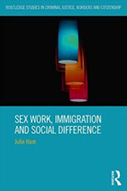Sex Work, Immigration and Social Difference

Author: Julie Ham
Publisher: London; New York: Routledge, 2017. 176p.
Reviewer: Teela Sanders | May 2017
This book has strong interdisciplinary appeal across the social sciences and allied subjects where there is interest in the lives of sex workers, and particularly those who are considered ‘migrant sex workers’. The book provides up-to-date insights from two continents, where sex workers juggle many categorizations as they navigate the racialization of sexual commerce. The underpinning principles of the research draw on the participatory action research (PAR) model, but the author acknowledges that only partial strategies of inclusion could be applied. Community engagement and reciprocity were founding influences in the methodological design and how the research was executed, working closely with sex worker groups and allies in both research sites (Melbourne, Australia and Vancouver, Canada) as much as possible. The methodology is detailed in Chapter 4, providing students with clear information and guidance about how to integrate PAR into doctoral work and the limitations on such research. The useful summary of the methodology flags up the challenges of researching sex work, and provides ideas for others to mirror and adapt in their own work as the centrality of doing PAR are borne out in the design of ethical research and the ‘goal of ethical, non-exploitative research’ (p.65). Interviews with 65 sex workers were based around six core themes: work related decision making; experiences with clients; interactions with systems (such as law enforcement); opinions about the direction of the industry; interactions with co-workers and demographics (p.58).
Theoretically, the book provides advancements in intersectionality theory (Chapter 3), noting that it is an under-utilized theory within this discipline that can tell us more about the categories and status of sex workers, particularly in relation to race, ethnicity and citizenship. The deconstruction of categories of ‘migrant’ and ‘sex worker’ are helpful developments, moving on from earlier works such as that of Laura Agustin (Sex at the Margins, Zed Books, 2007). The fluidity of terms are discussed as lived realities, showing how ‘status’ connected to these fixed administrative terms belies the complex realities of individual’s lives, trajectories and work patterns. These discussions on the application of intersectionality theory to sex work provide important background for the premise of Chapter 5, where the category of the ‘migrant sex worker’ is interrogated further.
The rich data from the interviews allow Ham to discuss the categories of the migrant sex workers in relation to their experiences of ‘immigration, migrant and racialized women in sex work’ (p.69), where the treatment of the ‘non-migrant’ is exposed. Key themes which we expect rich qualitative work to cover do not evade the reader: citizenship; motherhood; managing stigma; negotiating identity; economic and education mobility are just some of the elements of the sex workers’ lives which are interjected by their racial and migrant categorization.
One important new addition to the literature from this study is the contributions to our understanding of socio-legal perspectives, and how the ‘legalities and illegalities’ of sex work and the category of sex work (different in both cities) influences women’s lives and understanding of their work and their citizenship. The discussions in Chapter 6 are important, shedding more light on the damages of illegalities and the implications for working safely, forming identities and the dynamics of citizenship. Whilst the implications are not simply about legalitymaking life easier for sex workers, Ham works through the complexities of the law and regulatory processes surrounding sex work (in its different forms) on how work and workers are understood through the administrative lens, but also personally in relation to their own understanding of their labour, citizenship and legitimacy. Indeed, from this book scholars learn more about the ‘risks, challenges and opportunities afforded by different forms of regulation’ (p.125) which really does feed into the global debates on sex worker rights, regulation and social justice. For anyone teaching or researching sex work, this book brings the debates up to the minute and is also a captivating read, putting sex workers voices to the fore of the debates.
Teela Sanders is Professor in Criminology at University of Leicester


